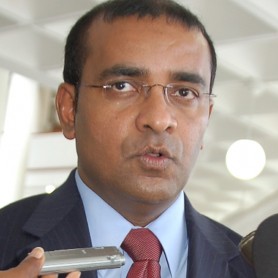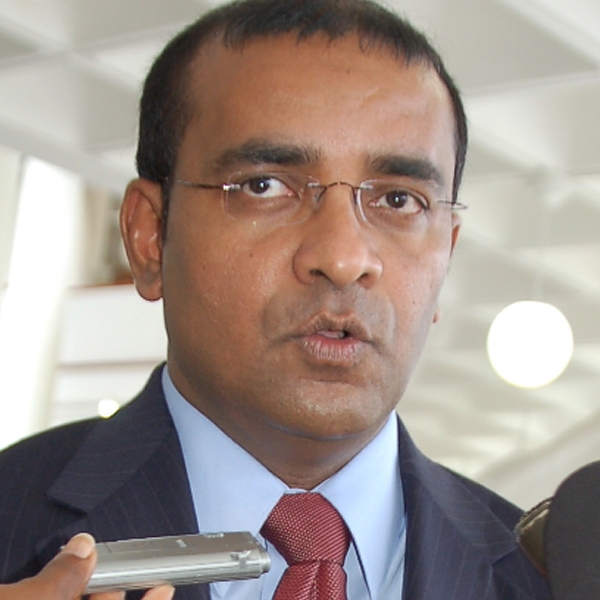– deflects question on sloth in setting up commission
President Bharrat Jagdeo has strongly denied Cabinet interference in the procurement process, explaining that waivers on tender procedures for contract awards receive “no objections” based on recommendations from the National Procurement and Tender Administration Board (NPTAB).

“The Cabinet doesn’t approve contracts now,” Jagdeo said, in response to a question at a news conference on Friday. He added, “We keep Cabinet out of that role, it offers a ‘no objection.’ So, if you look at our procurement law, we can’t say if a recommendation comes from the tender board, ‘we don’t agree with you so give it to the next person.’ We can say, ‘we don’t agree with the tender board for the following reasons and recommit it to the tender board.’”
The President’s comments came in response to questions raised about health sector purchases sourced by the Ministry of Health from the New Guyana Pharmaceutical Company Inc (New GPC) without adherence to the Procurement Act.
The issue has prompted Shadow Finance Minister Winston Murray to repeat calls for the establishment of the Public Procurement Commission (PPC), which he says needs to be operationalised to ensure transparency. Murray also told Stabroek News that international institutions need to hold the government to greater account than they have been for ensuring that the body is set up, in keeping with commitments enshrined in the law.
Last week it was revealed before the Public Accounts Committee (PAC) that three contracts totalling US$4.2M ($850M) that were awarded to the New GPC for the supply of drugs had not been subject to a formal tendering process. Also, the 2007 Auditor General’s report which was released on Thursday rapped the Health Ministry for previous purchases from the New GPC, which were flagged for being in breach of the Procurement Act since they were made on the basis of a Cabinet approval (CP (2003)11:4:M of 2003). However, the report noted that in July last year Cabinet granted its “no objection” to the NPTAB procedures being waived, to facilitate selective tendering for the ministry to purchase drugs and medical supplies” up to December 31, 2009. As a result, the ministry is applying for the NPTAB’s approval for each procurement.
According to Jagdeo, very few countries in the world, including some developed countries and no Caribbean nation, have taken Cabinet out of the approval process for the award of contracts. “We offer a no objection, so it means that the technical processes have to be done at the level of the tender board. So, if a ministry needs to get approval for waiver of tender board procedures for selective tendering, that waiver comes to the Cabinet for a ‘no objection,’” he explained.
He also explained that a previous policy allowed for single sourced purchases from the UN, which offered the lowest price internationally. Subsequently, it was decided that if a local producer could match the UN’s prices then the drugs would be procured from it. At the time, he said, the only local producer was the New GPC. Further, he noted that while the procurement law gives up to a 10% margin of benefit to local suppliers for procurement, the provision was not applied in this case.
Since the issue was raised in the 2006 Auditor General’s report, Jagdeo noted that the issue was resubmitted by Health Ministry to the NPTAB and then referred to Cabinet for no objection. “The cabinet offers a no objection; it has to come as a recommendation from the tender board. That is how it operates,” he explained.
Key
But PNCR-1G MP Murray said that the Procurement Act is clear about Cabinet’s role in the process. Section 54, he noted, says Cabinet shall have the right to review all procurements the value of which exceeds $15,000,000. Further, the Cabinet shall conduct its review on the basis of a streamlined tender evaluation report to be adopted by the NPTAB. Murray also emphasised that the Act stipulates that the Cabinet and, upon its establishment, the PPC shall review annually the Cabinet’s threshold for review of procurements, with the objective of increasing that threshold over time so as to promote the goal of progressively phasing out Cabinet’s involvement and decentralising the procurement process.
Subsection 6 further states that Cabinet’s involvement in reviewing procurements shall cease upon the constitution of the PPC, except in relation to those matters which are pending. “So once the Public Procurement Commission kicks in, Cabinet’s role within a short time thereafter is going to be ‘eliminated’ and this is the phasing out I am talking about,” he added.
Murray said the government has been reluctant to set up the PPC, which was one of the agreements brokered by national stakeholders and the process had been timetabled to be completed since last July. The selection of nominees to the commission is the responsibility of the PAC, which has been trying to complete the process since 2003.
After failing to reach consensus, the PPP/C withdrew its original nominees for the PPC and undertook to resubmit its candidates but has not done so for more than two years. Meanwhile, both the PNCR-1G and the AFC have submitted their nominees to PAC.
President Jagdeo deflected on Friday when asked to account for why the government has failed for more than two years to resubmit the names of its nominees for the PPC to the PAC. “What has been responsible for the eight years delay in discussions at the local government level?” he asked in response to the question, “the same ‘to-ing and fro-ing’ between PNC and the government.”
Jagdeo added, “Mr Murray comes from the PNC–what do you expect him to say. What does Mr Murray have to say about the delay [and] trying to stall the local government elections?”
According to Murray, the establishment is key to an improvement in the procurement process. However, he said, since the PPP/C’s commitment to resubmit its nominees, the issue has been raised at almost every PAC meeting and the PPP/C’s representative continues to maintain that the governing party is engaged in internal processes and as soon as they are completed it would submit the nominees. “That is the repetitive answer week after week, going on for almost two years,” Murray said.
He also explained that when the original nominees were submitted, it was the PNCR’s position that since the law requires persons of a certain calibre, a framework should be devised to assess the nominees’ resumes to seek the most competent among them. Meanwhile, the PPP/C recommended that the government get three nominees and the opposition two. “We have never said whether we have a problem with it or not,” Murray explained, adding “We have said we prefer to go the route of identifying these people.”
Conditions
Murray said the government is being allowed to get away with many things not consistent with good governance, citing the failure to establish the PPC as an example, for which he was critical of the posture of international institutions. “I believe that unless the international community takes a deeper interest, the government will let it drag on for an eternity,” he said.
In this regard, he acknowledged that there is always debate about whether attaching conditions to loan agreements affect sovereignty, recalling the government’s recent concerns about the UK’s proposals for the Security Sector Reform Plan. But Murray said ceding some degree of sovereignty is part of what is accepted as the price to obtain loans. “Once people are functioning in a context where they have to borrow, they are subject to giving up some amount of their sovereignty, whether at the individual level or the national level, because they want to set conditions,” he explained adding that it is up to the international community whether the establishment of the commission is worthy of being a condition.
He pointed out that the provisions for the PPC were only put into law because of international pressure but lamented that implementation has not been similarly stressed. “[The law] is on the books but that could not have been the end objective. The end objective certainly would be that this would be a measure that would be put in place so the people of Guyana could benefit. So people can see that the process was free and transparent and everybody has an equal chance. [And] so the objective remains unfulfilled,” he said. “Generally a lot of things exist on paper and I say the international institutions which come to this country, which interact with the government, ought to be holding the government to greater account than they have been for operationalising some of things they have agreed to and put in law but not put into effect.”

